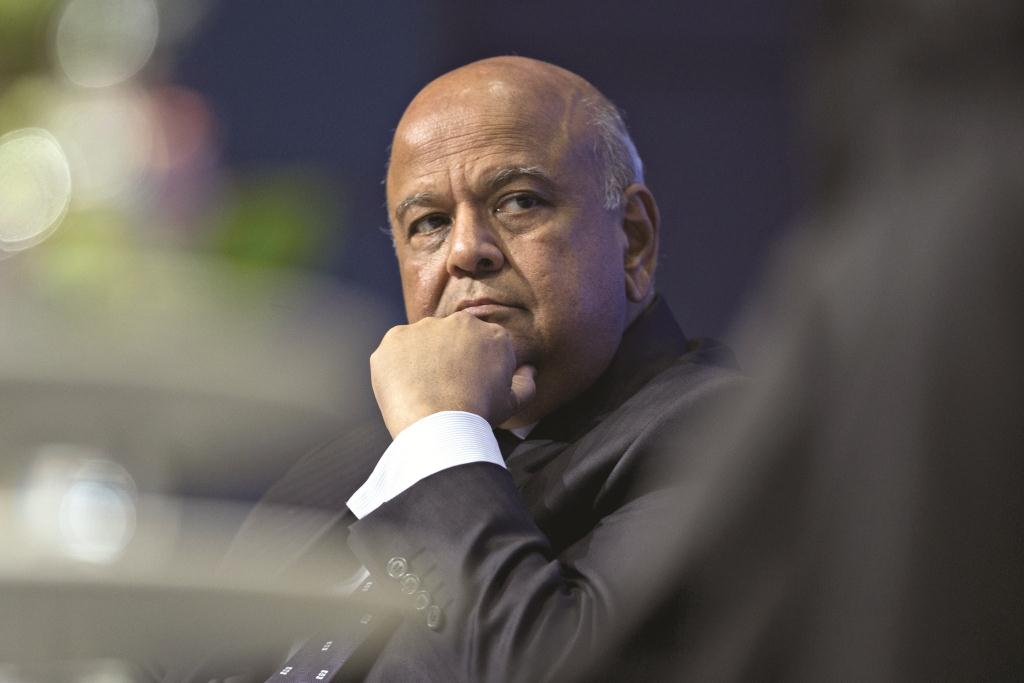On a bright summer morning in the leafy Johannesburg suburbs, investigators from the Hawks – South Africa’s FBI – knocked on the door with a summons for the country’s Finance Minister Pravin Gordhan. He wasn’t there and his family rang him to say there was a brigadier on the doorstep. This just two weeks before the crucial medium-term budget statement. A delicate budget that the ratings agencies will scrutinize as they ponder whether to downgrade South Africa’s economy to the dreaded junk status; a move that could mean higher interest rates, inflations, and more economic misery for an economy that’s already been 12 rounds with Mike Tyson in his prime.
“Not having found me at home, they proceed to go to the Treasury and I am not sure what happened there. Given the fiscal austerity, they might not have been given a cup of tea,” says Gordhan wryly.

“A date has been set to collect my fingerprints, they have been in the system for a long time, I suppose they need to freshen it up in some way. But this is a moment when South Africans should really ask themselves who are the Hawks, or these few people in the Hawks, really serving, where do they get their political instructions from and for what purpose? All we are trying to do within the Treasury is represent South Africa, make sure we manage its finances properly, present the best foot forward we can on behalf of the country and do that which is right whether it is in respect of university fees or more housing to be built or more money to be made available for the right kind of procurement purposes or anything that a treasury does in a normal country. It looks like we are in for a bit of excitement going forward.”
This was the avuncular Gordhan at his dry best at a Gauteng Province event, in Johannesburg, a few hours after the summons landed. The former Communist Party member is used to blows in a lifetime in politics. He became active in politics in the late 1960s and spent four years in the political underground operating around his birthplace of Durban, on the coast of KwaZulu-Natal.
Loading...
Gordhan was an unlikely revolutionary; he trained as a pharmacist, but lost his only job in the trade through his political activities. He spent the rest of the struggle in politics and was detained by police a number of times.
“I have known him through the liberation struggle for many years and I have never heard anything critical of him in all that time,” says Denis Goldberg, one of the men who faced the death penalty with Nelson Mandela in 1964.
Between 1999 and 2009, Gordhan was the Commissioner for the South African Revenue Service in the healthy years when the government used to take out advertisements to trumpet how the increasingly efficient system was gathering ever more revenue. It is from this abundant time that the fraud charge emanates.
On November 2, Gordhan will be charged, along with former colleague Oupa Magashula, with the misuse of public funds, said to be around R1 million ($71,000), in granting his former deputy, Ivan Pillay, early retirement, in August 2010. Lawyers say the case is wafer thin, but the very fact that a finance minister will stand in the dock will be enough to cause disquiet among foreign investors watching from afar.
The markets plunged on the day. The rand fell more than 3% within minutes of the announcement by the NPA.
Shaun Abrahams, the head of the NPA, has given Gordhan, Pillay and Magashula an opportunity to make representations to review the decision to prosecute or not. Magashula and Pillay have done so.
“I am currently considering the aforementioned representations… I have learned, through media reports, that [Gordhan] does not intend seeking me to review the aforementioned decision, I nevertheless invite [him]to make representations… by no later than 17h00 on 18 October 2016,” says Abrahams in a letter to Gordhan’s lawyers.
Gordhan refused. He says he has no confidence in the NPA’s willingness to give him a fair hearing.
“We have seen the letter by Freedom Under Law and the Helen Suzman Foundation dated 14 October 2016 in which we were copied. We invite you to withdraw the charges against our client in the light of the grounds set out therein. Our client does not intend to make representations to you for the considerations previously articulated,” his lawyer, Tebogo Malatji, of Gildenhuys Malatji Inc, said in a letter to Abrahams.
Political analyst Aubrey Matshiqi believes November 2 is merely the beginning.
“I think there will be additional charges. I think this case is far from over,” he says.
Matshiqi believes the rule of law is important and scoffs at the picture portrayed in the press of this being a case of good and evil; fiscal discipline versus the removal of a minister to ease access to state funds.
“I think the only thing we can quibble about is who, of the two, is the less evil. As far as I am concerned these are two wolves in sheep’s clothing. The only difference is one has better quality sheepskin.”
CEOs took out full page advertisements in newspapers in support of Gordhan; everyone from the Chamber of Mines, to Gauteng Premier David Makhura, to the short-term insurance industry, made statements backing the man.
Marches are also planned and hopes fanned that one of Africa’s biggest economies can paper over the cracks in time to avoid the dreaded downgrade at the end of the year. The reality is the damage has already been done.
Loading...
